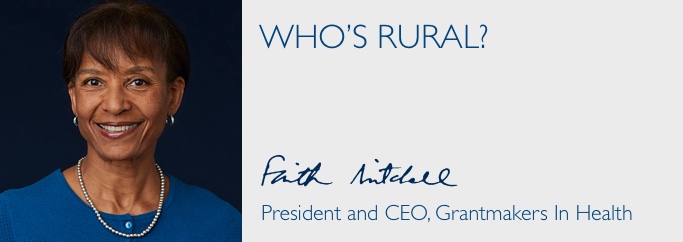
Rural issues have taken on new prominence in recent years, but for philanthropy, concern for rural communities—and for rural health specifically—is not new. Because so many U.S. counties include rural areas, foundations have funded rural health for decades. GIH, too, has a longstanding interest in rural health. Our first detailed report on rural health philanthropy was published in 2009, this is the sixth consecutive year that we have convened a two-day rural health meeting with the Federal Office of Rural Health Policy and the National Rural Health Association, and there were sessions on rural health at the 2018 annual conference.
I grew up in a rural Michigan community, where I lived on a dirt road and attended a one-room school. Later, I lived in a rural South Carolina community with such limited access to health care that its residents relied on herbal medicine. These first-hand experiences shape my thinking about rural life and make me especially sensitive to the question of “who’s rural?” When we talk in sweeping terms about rural communities and rural health, who are we actually talking about? Many people incorrectly assume that rural America is racially, culturally, and politically homogeneous. In fact, rural communities are historically diverse—and are becoming more so with time. Not appreciating this leads to inaccurate, generalized conclusions about the assets and challenges of rural communities, their health needs, and how they can partner with philanthropy.
According to sociologist Daniel Lichter, racial and ethnic diversity in rural America “may be the most important but least anticipated population shift in recent demographic history.” In the 2010 census, almost a quarter of rural residents were Native Americans, Alaska Natives, African Americans, or Latinos. In addition, there are rural counties in Texas, North Carolina, Idaho, and Kansas that have large concentrations of immigrants from dozens of countries. Rural communities of color can be found in Alaska, Hawaii, and Puerto Rico; on the current lands of tribal nations; in southern rural areas and small towns in the so-called Black Belt; and in the colonias along the Texas-Mexico border. Rural residents of European descent are similarly diverse, with varying histories, life experiences, and political ideologies.
Far too often, rural people are left out of the national conversation because of their geographical and social isolation from mainstream America. Yet they face significant health challenges. For rural people of color, these health challenges are often exacerbated by linguistic barriers, a historical legacy of displacement and segregation, and our nation’s immigration policies.
Children in rural communities are especially at risk, because rates of child poverty are higher in rural areas than they are in cities. Structural factors such as parental employment in low wage industries, lower education levels, and the limited availability of organized child care and transportation contribute to economic problems that are likely to persist throughout childhood and into adulthood. Geographic barriers to health care and exposure to adverse childhood experiences (ACEs) in environments with limited treatment resources also have lifelong effects.
We know a great deal about the causes of poor health in rural communities. Knowing how diverse rural communities are challenges funders to be as sensitive to issues of equity and inclusion in their rural grantmaking as they are in other settings. At GIH, we are mindful of the need to present the rural story in all its dimensions, to seek out solutions that are applicable in a variety of environments, and to lift up the connections that bind us to one another.

